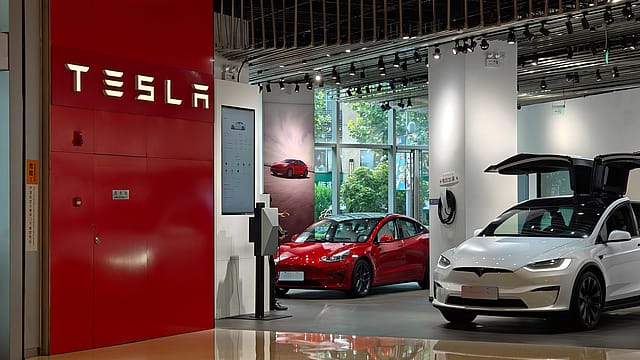Setback for Tesla? Govt says ‘no proposal’ to cut EV import tax
ADVERTISEMENT

There is no proposal either to provide an exemption from local value addition cost or to provide subsidy on import duty on the import of electric vehicles in India, Parliament was informed on Wednesday. The statement appears to be a setback for US electric vehicle (EV) manufacturing giant Tesla Inc, which was eying India entry shortly.
Minister of state for commerce and industry Som Parkash, in a reply in the Lok Sabha, was asked if the government has a proposal under consideration to exempt US EV giant Tesla Inc and other multinational car companies from local value addition of cost in heavy batteries, semi-conductors and even magnetic parts, and also subsidy on the import duty on electric vehicles in India.
The junior minister replied the government has taken a series of policy initiatives and measures to create a conducive ecosystem to promote industrialisation and domestic value addition and to make India globally competitive. However, he says there's no plan to exempt companies from local value addition costs or to provide subsidies on the EV import duty.
Tesla has been in talks with government officials, primarily seeking lower import duties initially before it could plan local production.
"Government has also taken various steps to boost domestic and foreign investments in India to enhance local value addition under Make in India initiative. These include the introduction of Goods and Services Tax, reduction in corporate tax, improving ease of doing business, FDI policy reforms, measures for reduction in compliance burden, measures to boost domestic manufacturing through public procurement orders, Phased Manufacturing Programme (PMP) and QCOs (Quality Control Orders), to name a few," the minister says.
The minister also elaborated on the Centre's Production Linked Incentive (PLI) Scheme for the automobile and auto component industry, which has a budgetary outlay of ₹25,938 crore, saying it aims to provide financial incentives to boost domestic manufacturing of advanced automotive technologies (AAT) products (including EV and their components).
The government has also approved the PLI scheme "National Program on Advanced Chemistry Cells (ACC) Battery Storage", with a budgetary outlay of ₹18,100 crore, the minister says, adding that it incentivises the establishment of Giga scale ACC manufacturing facilities for 50 Giga Watt hour (GWh).
This year in June, Tesla CEO Elon Musk, after meeting Prime Minister Narendra Modi in New York, had said he was confident that his company would be in India as soon as humanly possible. "I would like to thank the Prime Minister for his support and hopefully we will be able to announce something in the not-so-distant future. We don't want to jump the gun on an announcement but I think it is quite likely that there will be a significant investment in our relationship with India," Musk said.
The country's EV market is expected to grow to 10 million units in annual sales by 2030 and create 50 million jobs. The government data show there had been a 300% rise in EV sales in 2022, and the market potential is expected to reach $266 billion by 2030.